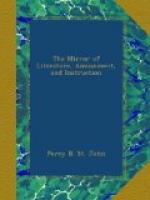“The fire raged four days and nights; and on the fifth of September, London, from the Tower to Fleet-street, was as if a volcano had burst in the midst of it, and destroyed it, the very ruins being calcined, and nothing remaining in the most populous part, to show the inhabitants where they had lived, except a church here and there, or an old statue. I looked into it, three days afterwards, when the air was still so hot, that it was impossible to breathe; and the pavement absolutely scorched the soles of my shoes.
“The loss of property by the fire was of course far greater than that by the plague, and yet assuredly it was not felt a thousandth part so much, even in the city; for money, even with the lovers of it, is not so great a thing, after all, as their old habits and affections. The wits at court never chose to say much about the plague; but the fire, after the fright was over, was a standing joke. And the beneficial consequences to the city itself soon became manifest, in the widening and better building of the streets, an improvement which came in aid of the cleanliness that was resorted to against the plague; so that instead of a judgment against the King and his government, Rochester said, in his profane way, that heaven never showed a judgment of a better sort.”
We need scarcely add our commendation of these delightful volumes. Each page teems with life, and everywhere to use an expression of the writer, his “soul rises with springy freshness.” The portraits, and to use a familiar term of artists, the bits of painting, have the touches of a master-hand, and they are interwoven with genius which enlivens art and embellishes nature.
[1] At or near Mickleham, by the way, the writer might
have commanded a
distant view of the burning
City. On a fine, clear day we have often
discerned the dome of St.
Paul’s from one of the hills rising from
Mickleham to Norbury Park.
[2] Evelyn, speaking of this night, says, that it
was “light as day for
about ten miles round about,
after a dreadful manner.”—Memoirs,
vol.
i. p. 391. second edit 4to.
Sir Ralph does not seem to make the light
so strong, though he does
not absolutely say it was otherwise. Perhaps
Evelyn speaks of a later hour.
The flames appear to have become
visible afterwards to the
distance of forty miles.—Edit.




